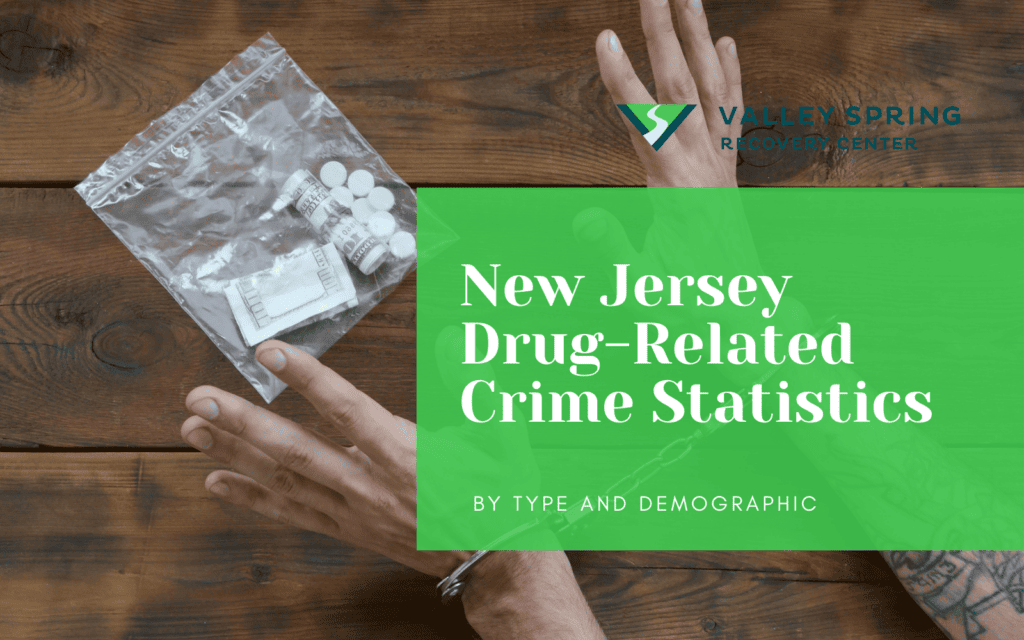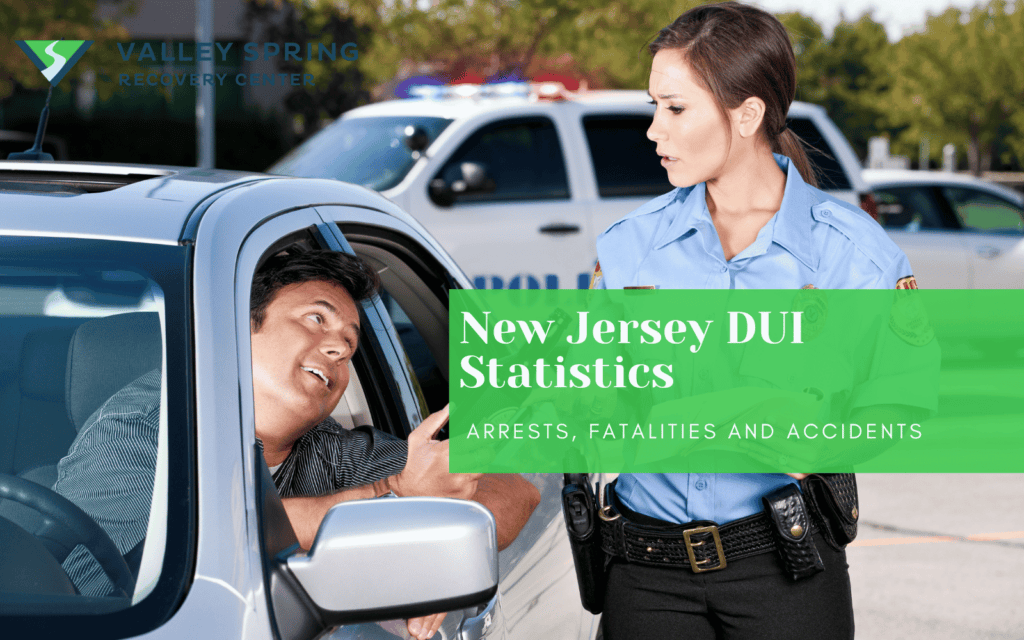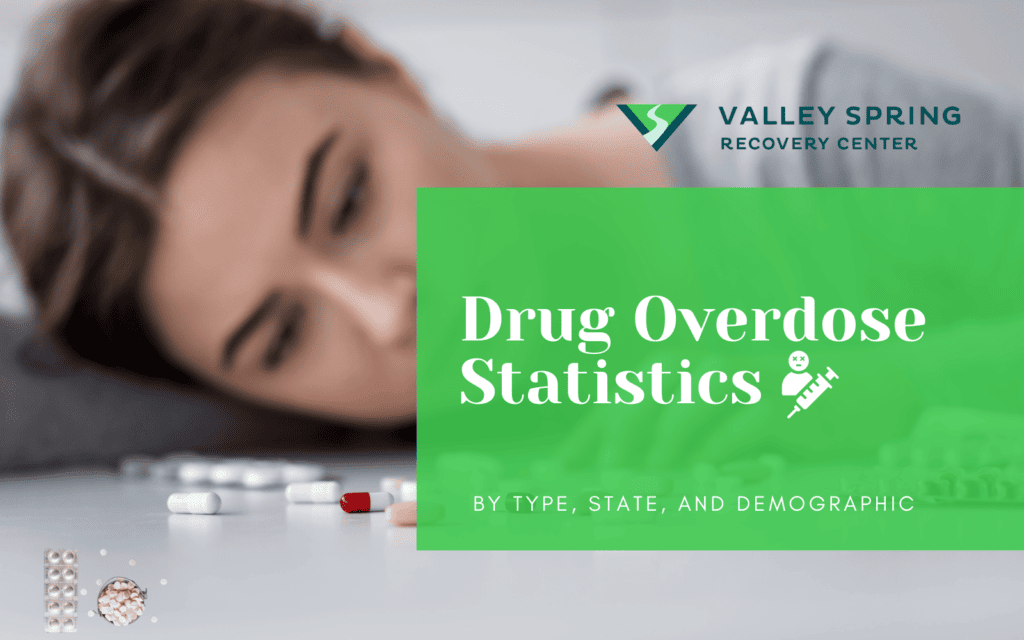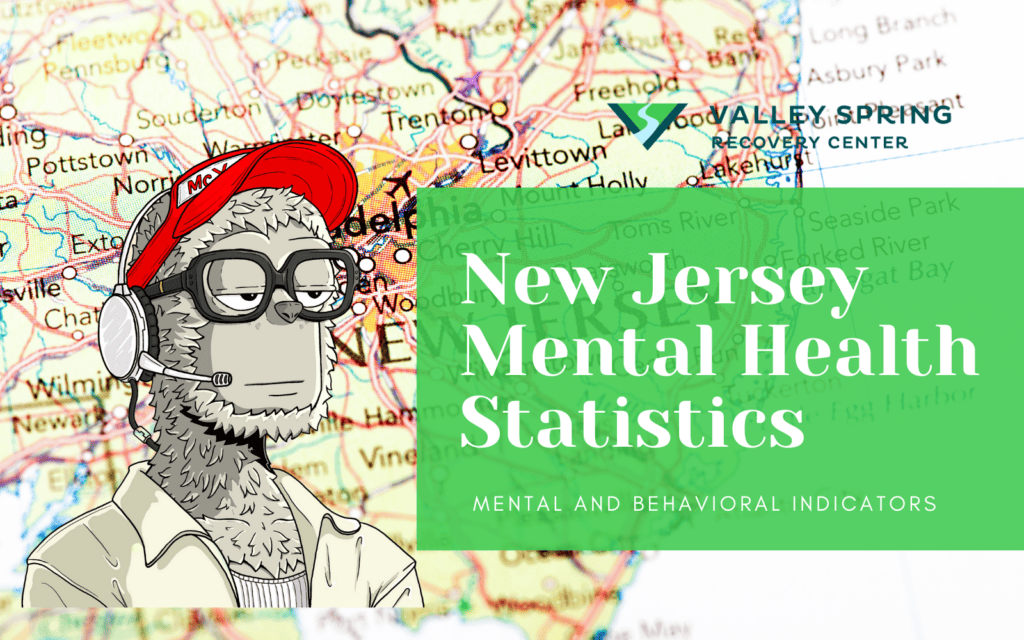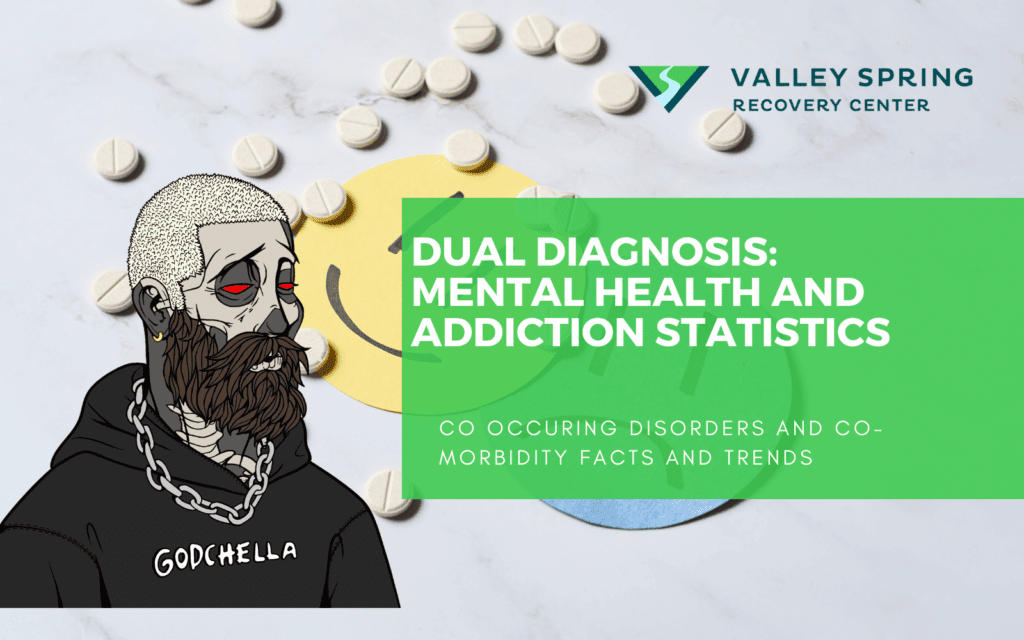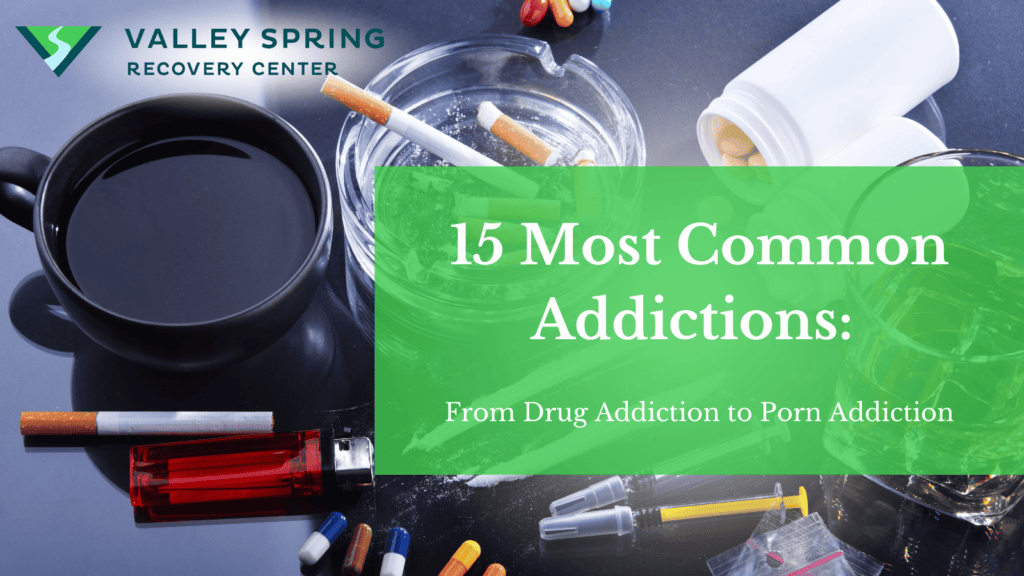Drug use and related crime have long been a concern in New Jersey. These crimes endanger public safety, strain law enforcement resources, and contribute to community instability.
Drug-related offenses include possession, distribution, and trafficking of illegal substances that lead to violence, addiction, and socioeconomic disparities.
In addition, property crimes like shoplifting and burglary stem from the desperate need for cash to buy drugs. Violent crimes, such as assault and homicide, erupt over drug debts or disputes between rival dealers.
Key Takeaways:
- Drug-related arrests in New Jersey constituted over one-fifth of all reported arrests in 2019.
- The major contributing factors to drug-related crimes in New Jersey include drug law violations and larceny-theft.
- Nearly 80% of drug-related arrests in New Jersey are standalone cases, solely related to drug offenses and not linked to other crimes.
- New Jersey reportedly spent an estimated $5.1 billion between 2010 and 2019 on drug war-related police arrests.
- Street gangs in New Jersey play a significant role in drug trafficking and violent crimes.
- Certain New Jersey counties, such as Salem, Cape May, and Cumberland, exhibit notably high rates of drug-related arrests per 100,000 inhabitants.
- Racial disparities persist in drug-related arrests, with Black individuals in New Jersey being 3.3 times more likely to be arrested compared to white individuals.
General Drug-Related Arrest Statistics
According to the New Jersey Division of Criminal Justice (NJDCJ), drug-related crime in New Jersey is reaching alarming rates. Here are some key stats on drug-related arrests:
- New Jersey Policy Perspective reports that in 2019, 21.6 percent (or over one-fifth) of all reported arrests by New Jersey’s state and local police departments were related to drugs.
- A 2016 report by the New Jersey Department of Human Services found that in 2013, there were 68,449 drug-related arrests in New Jersey. The major contributing factors to drug-related crimes were:
- Drug law violations (608 arrests per 100,000 inhabitants)
- Larceny-theft (291 per 100,000)
- Other assaults (261 per 100,000)
- The alcohol-related arrest rate for New Jersey in 2013 was 442 arrests per 100,000 inhabitants. The major contributing factors to alcohol-related crimes were:
- Larceny (291 per 100,000)
- Driving under the influence (282 per 100,000)
- Other assaults (261 per 100,000)
- According to the New Jersey Department of Law and Public Safety, the primary reasons for arrests in New Jersey were related to drugs and drug paraphernalia, with nearly 500,000 cases recorded over six years from 2014 to 2020.
- 80% of arrests related to drug use or possession in New Jersey are standalone. These arrests are solely for drug-related offenses and would not have occurred for any other reason.
- 15% of the police budget in New Jersey goes toward drug war arrests.
- New Jersey spent $5.1 billion between 2010 and 2019 on police arrests related to the drug war.
- The 2000 National Street Gang Survey Report verifies that the majority of the 19 gangs documented in the state are engaged in assaults, drive-by shootings, and murders.
Drug-Related Arrests by County
Key statistics on drug-related arrests by county include:
- The top five drug-related arrests were in Salem County, Cape May County, Cumberland County, Camden County, and Essex County.

- In 2016, the American Civil Liberties Union identified six counties in the state—Bergen, Burlington, Camden, Gloucester, Monmouth, and Union—for having the highest number of marijuana arrests and the highest arrest rates per 100,000 people.

- The likelihood of becoming a victim of drug-related crime in New Jersey ranges from 1 in 860 in the southeast section to approximately 1 in 118 in the eastern neighborhoods.
Alcohol-Related Arrests by County
Statistics on alcohol-related arrests in different New Jersey counties include:
- Among New Jersey counties, the five greatest number of alcohol-related arrests were in Cape May, Salem, Cumberland, Atlantic, and Monmouth.

Drug-Related Arrests by Crime
New Jersey statistics on drug-related arrests by crime include:
- According to the New Jersey Chartbook of Substance Abuse-Related Social Indicators, the top five most common drug-attributed crimes in New Jersey are:
- Larceny
- Other assaults
- Aggravated assault
- Burglary
- Robbery

- As per the New Jersey Drug Threat Assessment by the National Drug Intelligence Center, 70% of violent crimes stem directly from illegal drug involvement. Heroin accounts for 38% of all federal sentencing cases, a significant contrast to the national average of 8%.
Marijuana-Related Arrests
- In 2013, there were 27,923 arrests related to marijuana possession and distribution.
- In 2017, the number of marijuana-related arrests increased to 37,623.
- In 2013, there were an average of 66 arrests per day for marijuana possession.
- By 2017, this average daily arrest rate had risen to 95 for marijuana possession.
Drug-Related Arrests by Age
The following data from New Jersey’s Division of Mental Health and Addiction Services outlines drug-related arrests in 2013 categorized by age groups:
- For individuals aged 0 to 17, there were 6,250.3 arrests, which resulted in an arrest rate of 305.3 per 100,000 people in this age range.
- Among those aged 18 years and older, there were 63,749.2 arrests, with an arrest rate of 939.5 per 100,000 individuals.
- Across all age groups, there were 69,999.5 drug-related arrests, which led to an arrest rate of 792.5 per 100,000 people.

Drug-Related Arrests by Race
Black residents in New Jersey are 3.3 times more likely to be arrested for drug offenses compared to White individuals, even though Whites use and sell illegal drugs at higher rates.
The racial gap is more pronounced in some counties. For example:
- In Hunterdon County, Black individuals are 11 times more likely to be arrested than White individuals.
- In Ocean County, Black individuals are seven times more likely to be arrested than White individuals.
- In Salem County, Black individuals are six times more likely to be arrested than White individuals.
Alcohol-Related Arrests by Age
The New Jersey Division of Mental Health and Addiction Services reported that in 2013, the number of alcohol-related arrests by age was as follows:
- For individuals aged 0 to 17, there were 2,348 arrests, which led to an arrest rate of 114.7 per 100,000 people.
- Among those aged 18 years and older, there were 37,015.7 arrests, with an arrest rate of 545.5 per 100,000 individuals.
- For all age groups, there were 39,363.7 arrests with an average arrest rate of 445.7 per 100,000 people.

What Are the Charges for Drug Trafficking in New Jersey?
In New Jersey, drug trafficking penalties depend on the type and quantity of drugs involved. For example, trafficking Schedule I or II drugs could mean up to 20 years in prison, with mandatory minimum sentences of life imprisonment and fines of up to $750,000 or five times the street value of the drugs.
Similarly, marijuana trafficking might lead to fines between $25,000 and $200,000 and prison terms of 3-15 years, while heroin trafficking could result in fines from $50,000 to $500,000 and prison sentences of 3-25 years.
Did New Jersey Decriminalize Marijuana?
Yes, New Jersey decriminalized marijuana following the passage of a constitutional amendment approved by voters in November 2020. The amendment led to the legalization of cannabis use and possession for adults 21 years and older. After the voters’ approval, Governor Phil Murphy signed three bills into law on February 22, 2021, which together legalized cannabis use and possession in limited amounts for adults 21 years and older and decriminalized the possession of small amounts of marijuana.
The New Jersey drug laws and policies marked a significant shift in New Jersey’s approach to marijuana, aiming to reduce arrests for marijuana possession and address racial disparities in drug-related arrests. The legislation also established a regulated cannabis market in New Jersey, with details on licensing, taxation, and distribution outlined in the legal framework.
How do the New Jersey addiction statistics impact drug-related crime?
The relationship between New Jersey’s addiction statistics and drug-related crime involves several key factors:
- Decrease in Marijuana Arrests: The decriminalization of marijuana has led to fewer arrests for its possession, lightening the load on the criminal justice system and redirecting focus towards more serious drug-related crimes.
- Focus on Serious Crimes: Legal changes allow law enforcement to concentrate efforts on combating hard narcotics trafficking, potentially making drug enforcement more effective.
- Persistent Drug Trafficking: Despite marijuana legalization, demand for other illicit drugs sustains drug trafficking and related criminal activities.
- Addressing Root Causes: Tackling underlying issues like poverty and lack of healthcare access is vital for reducing both addiction and drug-related crime.
- Emphasis on Treatment: Shifting the approach from criminalization to treatment and rehabilitation for addiction may reduce recidivism and drug-related offenses.
- Community Impact: High addiction rates affect community safety. Programs focusing on education and support are essential for community well-being.
New Jersey’s move to decriminalize marijuana may have immediate benefits in reducing certain drug-related arrests, addressing the broader spectrum of addiction and its link to crime requires a multifaceted strategy encompassing law enforcement, public health, and social support systems.
Do mental health rates play a role in drug-related crime?
Mental health rates significantly impact drug-related crime through:
- Self-Medication: Individuals with mental health issues may use drugs as self-medication, leading to substance abuse and related criminal activities.
- Impaired Decision-Making: Mental health disorders can impair judgment, increasing the likelihood of engaging in drug-related crimes.
- Co-occurring Disorders: The presence of both mental health and substance abuse disorders complicates treatment and elevates the risk of criminal behavior.
- Lack of Services: Insufficient mental health services can result in individuals entering the criminal justice system instead of receiving needed care.
- Recidivism: Without proper mental health treatment, individuals are more likely to revert to drug use and criminal behavior after incarceration.
Effective strategies to reduce drug-related crime involve enhancing access to mental health services, integrating treatment for co-occurring disorders, and developing diversion programs to provide care over incarceration.
Dr. Michael Olla
All author postsShare This Post

